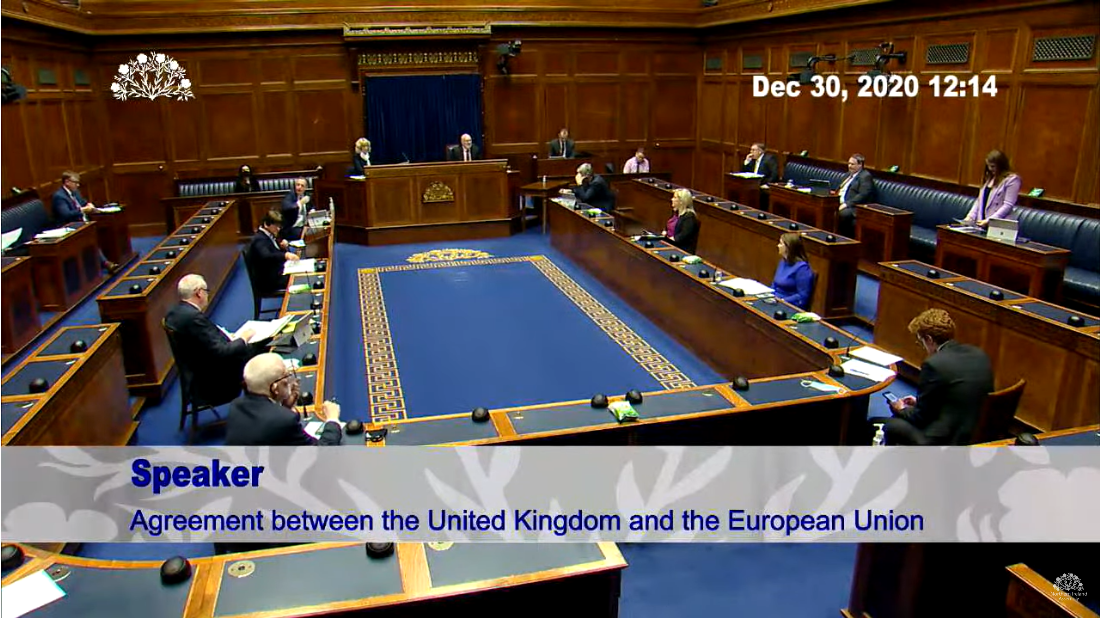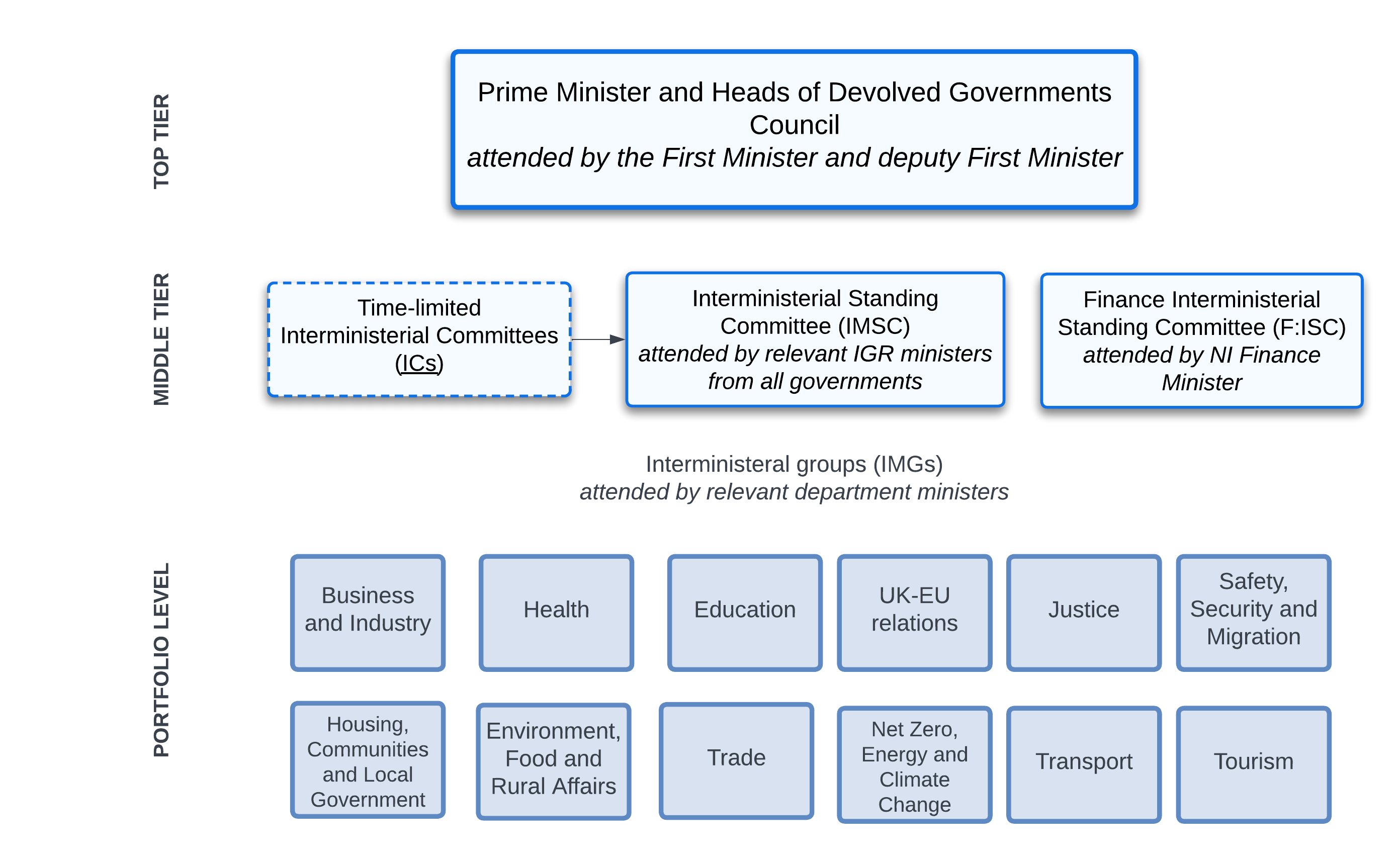Brexit and Devolution
Synopsis: The UK’s exit from the EU has implications for the devolution settlement and the matters on which the Assembly can legislate. On this page you will find more information about the bodies facilitating engagement between the devolved administrations and the UK Government on Brexit, as well as the Common Frameworks process, which is intended to facilitate a collaborative approach between the devolved administrations and the UK Government in devolved policy areas which were previously governed by EU law.
Implications of Brexit for devolution
Under the Good Friday Agreement, legislative and executive powers were devolved (transferred) to the Northern Ireland Assembly. Health, education, roads, and housing are some of the devolved policy areas. During the UK’s membership of the European Union, many matters under these areas were regulated by European Union rules on the Single Market. New rules now need to be agreed between the four nations of the UK in these areas, to avoid barriers to trade and divergence in standards. The UK Government has committed to work closely with the devolved administrations to develop Common Frameworks in these areas.
Common Frameworks
Click here to view a PDF explainer on Common Frameworks (PDF, 576 KB)
Common Frameworks are being developed in policy areas which were previously governed by EU law and which intersect with devolved competence. The principles for establishing Common Frameworks were agreed by the UK and devolved governments. They aim to ensure a common approach is taken by devolved administrations in these areas and are being established to:
- Enable the functioning of the UK internal market, while acknowledging policy divergence;
- ensure compliance with international obligations;
- ensure the UK can negotiate, enter into and implement new trade agreements and international treaties;
- enable the management of common resources;
- administer and provide access to justice in cases with a cross-border element;
- safeguard the security of the UK.
[Source: JMC(EN) communiqué October 2017]
Furthermore, the Committee agreed that Common Frameworks will respect the devolution settlements and the democratic accountability of the devolved legislatures, and that “the competence of the devolved institutions will not normally be adjusted without their consent”.
The principles also state that frameworks will recognise the “economic and social linkages between Northern Ireland and Ireland”, noting that Northern Ireland “will be the only part of the UK which shares a land frontier with the EU”.
Responsibility for the Common Frameworks process lies with the Department for Levelling Up, Communities and Housing, and the Minister for Intergovernmental Relations.
Common Frameworks and the Internal Market Act
The UK Internal Market Act 2020 (IMA) operates on the basis of two market access principles: non-discrimination and mutual recognition. Non-discrimination means that regulations in one region of the UK should not discriminate against goods or services from another region of the UK. Mutual recognition ensures that any goods and services sold legally in one part of the UK can also be sold in any other part of the UK.
The IMA was amended during its passage through Parliament to acknowledge the role of frameworks: some regulations may be excluded from the market access principles, if this is agreed through the Common Frameworks process. Each of the four UK governments can propose exclusions as outlined in the process for considering UK Internal Market Act exclusions in Common Framework areas.
EXAMPLE: Ban on single use plastics
The first formal request to exclude a regulation from the market access principles was made by the Scottish Government for its ban on certain single use plastics from 1 June 2022. The UK Government made the United Kingdom Internal Market Act 2020 (Exclusions from Market Access Principles: Single-Use Plastics) Regulations 2022 using the powers under Section 10 of UK IMA. This came into force on 11 August 2022. The devolved governments were asked for their consent before this regulation was made. Read more information from the Scottish Parliament on 'Scotland’s Ban on Single-Use Plastics: a case study of the impact of the UK Internal Market Act'.
Common Frameworks and Retained EU Law
Commons Frameworks also interact with the Government’s changes to retained EU law, through the Retained EU Law (Revocation and Reform) Act 2023. Most frameworks are underpinned by some retained EU law. The UK Government has said that “where Common Frameworks are operating they are the right mechanisms for discussing retained EU law reform in the areas that they cover.”
The House of Lords has been told there are 240 laws (out of the approximately 600 repealed at the end of 2023) which refer to Common Frameworks.
The NI Assembly and Common Frameworks
Due to the differing devolution settlements, each devolved administration will participate in a different number of Common Frameworks. Out of the three devolved administrations, the largest number of Frameworks apply to Northern Ireland. In addition, given the provisions of the Windsor Framework (WF) for Northern Ireland, the development of each Common Framework must take the WF and any potential for NI-GB divergence into account.
The Cabinet Office set out a 5 Phase delivery plan for common frameworks. During this process, parliaments in the devolved administrations, as well as stakeholders, have an opportunity to scrutinise the Common Frameworks and provide their views to the responsible Minister. Northern Ireland Assembly Committees began scrutinising Common Frameworks in 2020. The Committee for the Executive Office has oversight of the Common Frameworks programme, while various statutory committees scrutinise frameworks in their relevant areas.
The Common Frameworks which apply to Northern Ireland:
|
Assembly Committee |
Common Framework |
Type |
|
AERA |
Legislative |
|
|
AERA |
Legislative |
|
|
AERA |
Non-legislative |
|
|
AERA |
Non-legislative |
|
|
AERA |
Agriculture - Zootech |
Non-legislative |
|
AERA |
Non-legislative |
|
|
AERA |
Legislative |
|
|
AERA |
Non-legislative |
|
|
AERA |
Non-legislative |
|
|
AERA |
Non-legislative |
|
|
AERA |
Non-legislative |
|
|
AERA |
Non-legislative |
|
|
AERA |
Non-legislative |
|
|
AERA |
Non-legislative |
|
|
AERA/Economy |
Non-legislative |
|
|
Economy |
Mutual Recognition of professional qualifications (MRPQ) |
Non-legislative |
|
Economy |
Services Directive |
Non-legislative |
|
Economy |
Non-legislative |
|
|
Economy |
Specified quantities and packaged goods |
Non-legislative |
|
Economy |
Non-legislative |
|
|
Finance |
Non-legislative |
|
|
Health |
Non-legislative |
|
|
Health |
Non-legislative |
|
|
Health |
Non-legislative |
|
|
Health |
Non-legislative |
|
|
Health |
Non-legislative |
|
|
Health |
Non-legislative |
|
|
Infrastructure |
Non-legislative |
|
|
Infrastructure |
Non-legislative |
|
|
Infrastructure |
Non-legislative |
|
|
Infrastructure |
Non-legislative |
|
|
Infrastructure |
Non-legislative |
Schedule 3 of EU (Withdrawal Act) 2018 required the UK Government to lay reports on the progress of Common Frameworks every three months. Progress reports can be found by following this link.
Legislative Consent
According to the Sewel Convention, when the UK Parliament is legislating on matters within the devolved competence of the administrations of Northern Ireland, Wales, and Scotland, the Government should “not normally” do so without the consent of the devolved administration. The devolved administrations can indicate their consent for Westminster to legislate on a devolved matter by agreeing a legislative consent motion (LCM). Ultimately the principle of parliamentary sovereignty means that Westminster has the power to legislate on any matter, whether devolved or not. In June 2022, the UK Government confirmed it has legislated without consent from the devolved administrations on 11 occasions since December 2019, mostly relating to EU exit. You can find details of the LCMs which the Assembly has considered in relation to Brexit by following this link.
 On 30 December 2020, the Northern Ireland Assembly debated the UK-EU Trade and Cooperation Agreement and agreed “to decline legislative consent to the British Government to impose the European Union (Future Relationship) Bill”
On 30 December 2020, the Northern Ireland Assembly debated the UK-EU Trade and Cooperation Agreement and agreed “to decline legislative consent to the British Government to impose the European Union (Future Relationship) Bill”Intergovernmental and interparliamentary relations
Review of intergovernmental relations
In January 2022, the UK Government (UKG) published the conclusions of the review of intergovernmental relations (IGR), which was jointly conducted by UKG and the devolved administrations. All four administrations have agreed to work under the new arrangements set out in the review.
The new structures and processes are based on the following principles:
- Maintaining positive and constructive relations, based on mutual respect for the responsibilities of the governments and their shared role in the governance of the UK;
- Building and maintaining trust, based on effective communication;
- Sharing information and respecting confidentiality;
- Promoting understanding of, and accountability for, their intergovernmental
activity; - Resolving disputes according to a clear and agreed process.
The review established a three tier structure of engagement for intergovernmental relations:
- Top tier: The Prime Minister and Heads of Devolved Governments Council will oversee intergovernmental relations
- Middle tier: Engagement on cross-cutting issues, including an Interministerial Standing Committee and a Finance Interministerial Standing Committee
- Lowest tier: Interministerial Groups (IMGs) for specific policy engagement at official and ministerial level

Structure of UK Intergovernmental Relations
The review contains a new process for avoiding, escalating and resolving disputes. An IGR Secretariat has been established to provide administrative support. In addition to existing groups, several new Interministerial Groups (IMGs) were established including an IMG on the EU-UK Trade and Cooperation Agreement and an IMG on Trade.
This research briefing from the Commons Library contains further information about intergovernmental relations in the UK, including historical intergovernmental relations, intergovernmental relations and Ireland, and interparliamentary relations.
Inter-Parliamentary relations
The Inter-Parliamentary Forum on Brexit was established in 2017 to provide an opportunity for dialogue between legislatures in the UK to support more effective scrutiny of Brexit and related issues. Following on from this, a new Inter-parliamentary Forum (IPF) was established in February 2022. It comprises relevant Chairs and Convenors of Committees scrutinising Brexit-related issues in the House of Commons, House of Lords, Scottish Parliament and Senedd .The Forum aims to provide a mechanism for dialogue and cooperation on challenges arising from the new constitutional arrangements post-Brexit. Read more about Inter-Parliamentary relations.



